
FACES for the Future students in San Diego are a special part of the Rady Children’s Hospital family. When I first met Dr. Tomás Magaña in 2008, I was inspired by the work he had been doing and the students I met in Oakland. My intention was to develop a similar program for a group of students at Hoover High School in City Heights, an urban neighborhood in San Diego. We worked with all our heart to design a program that would provide academic rigor, career exploration and campus visits to a variety of colleges and universities, professional development and real-world career experience. We worked with clinicians in our hospital to design relevant career experiences, funders to provide support and guidance, and school counselors to manipulate what was to me the mysterious master schedule so we could group the students in a cohort that would travel through the program together for the next 3 years. We recruited 25 sophomores, and planned to take up to 30 new sophomores each year for a total enrollment of 90 students. We identified a program coordinator and a team of teachers. Then we turned on the switch and our enthusiasm was contagious. Every aspect of the program we had planned was important, but the magic of the program shines through a heart-centered approach that values compassion, family, friendship, community and purpose.
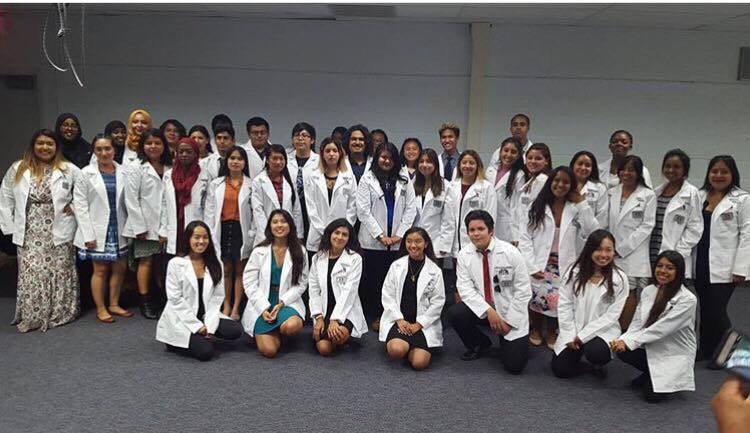
Lab Coat Ceremony for Class of 2017.
Our students are learning, growing, graduating high school, setting career goals, pursuing post-secondary education and our first class is just starting to embark on their careers. FACES has become very popular with students. Today the program has grown to nearly 300 students at Hoover High, expanded to another 80 students at nearby Crawford High, and has become a highly reputed program in San Diego. Each year we ask the students what has been the most important part of the program over their years, and each year we hear the same response: the sense of family and the opportunity for real world experiences with people who care. The refrains I’ve heard from the students are, “if it weren’t for the FACES family I would have dropped out of school, I couldn’t have done this, I wouldn’t be going to college, I don’t know where I would be, I wouldn’t have been able to handle my life, I would have no purpose.” And each year I reflect on – how does this happen? I ask myself, “How does a group of diverse students, representing a wide range of cultures, ethnicities, languages, histories, beliefs, struggles and community experiences become a family and why is this so critical to their success?”
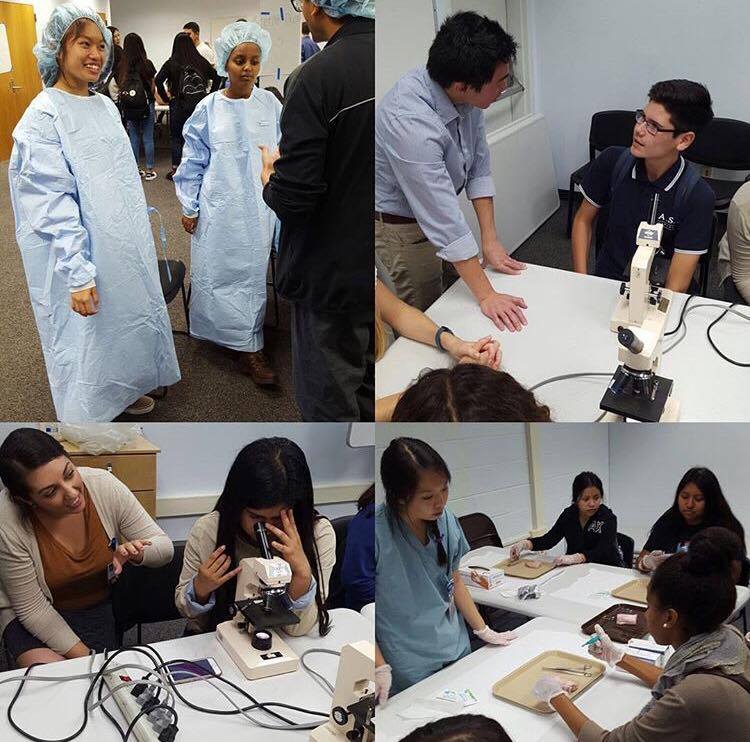
Sophomore and Junior students at Doc 4 a Day with UCSD residents.
What I have seen is that the sense of belonging, connectedness and community is truly a protective factor for youth that builds their resiliency and self-confidence. What I have come to understand is this starts with the passion, determination, and a heart-centered approach of a few influential champions whose desire is to inspire and provide equal opportunities for disadvantaged youth to reach their full potential. This is a powerful catalyst and at the core of starting a new program. Everything radiates from this. Selection of program staff and teaching staff is key, and an essential ingredient beyond technical skills and knowledge is the embodiment of the same determination and heart-centered approach. The staff are role models, leaders, coaches, educators, confidants, cheerleaders, trouble shooters, planners, integrators and a resource for the students. In our programs, the school provides space for the FACES program, and the staff are housed at the school every day and available to the students. They guide a culture of compassion and purpose, providing workshops, coordinating college field trips and team building activities, monitoring student performance, providing psycho-social support, arranging for and coordinating career experiences for the students, and connecting with teachers, school counselors, other school personnel and parents. They give their heart, and the program leaders provide training and resources to encourage their self-care, reflection, a learning environment, camaraderie and building their own sense of family, direction and purpose.
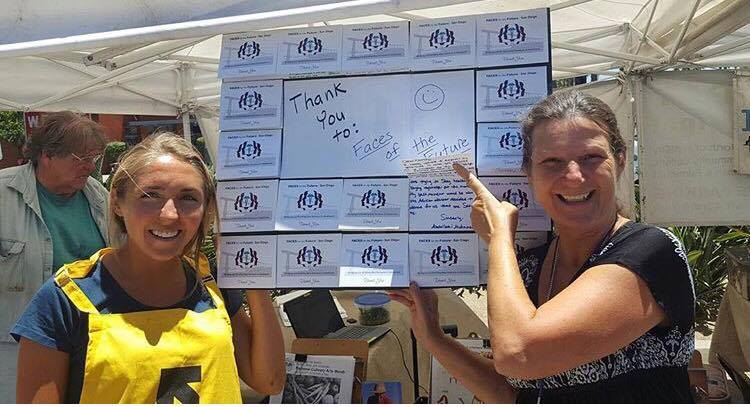
Farmer’s Market community with Thank You cards from FACES students.
Building this positive sense of community for the students starts with engaging them in the community. Our community partners are an essential and integral part of FACES, helping the students build community while learning about the importance of social and economic determinants that influence optimal health outcomes and one’s ability to reach their full potential in a life of purpose. The students get started participating in community service activities in their first years in the program, and in their junior year they are placed in community health-related organizations for job shadowing and career experience rotations. Community organizations are selected that have a strong mission and purpose in the community, can provide a supervised experience for student learning, and mimic the same determination and values of the FACES program. It is an opportunity for the students to learn about health topics and resources available to them and their families and neighbors, while shadowing professionals in community-based health related careers. To reinforce their learning and experience, the juniors then conduct a school-based health fair for the student body; educating their peers and sharing how to access resources. As they educate their peers they become the experts and gain confidence in their own abilities and knowledge. For many students this is their first experience requiring them to be accountable in a professional setting and it also builds their sense of connection and pride with the larger community in which they live. By the time the students begin their clinical rotations in Rady Children’s, they have been well-prepared and well-supported and are welcomed into the Rady Children’s family of caregivers. This is frequently when students become inspired to pursue specific career pathways. Hospital staff mimic the same values and demonstrate heart-centered care and support. For the students, these experiences, coupled with team building, college tours, and workshops all work together to create a structure where the students are learning together, sharing new experiences, teaching each other, and building a sense of connectedness. This is the “sense of family” the students talk about.
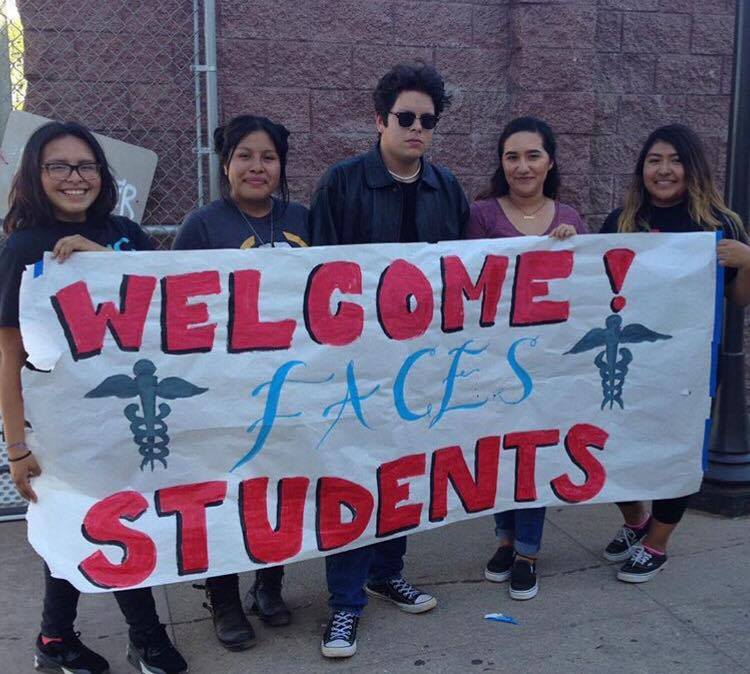
Students welcoming new students to the FACES family!
I believe what sets FACES apart as not just another career internship program is the underlying philosophy and daily demonstration of a heart-centered approach and belief that compassion, sense of family, community, and purpose is of utmost importance. Of course we focus on academic rigor and career exploration, and FACES is a health career pathway program, but it truly a unique youth development program. A young person’s character and purpose is not developed passively. Through experiences and trials and overcoming obstacles, coupled with the support of a compassionate family and community, students grow their inner strength, create clear visions, inspire their ambition, and set a path to create their own opportunities and achieve their own success. In turn, they become equipped to become compassionate professionals, family members and leaders who will bring positive energy and change in a complex world. There is an old Cherokee saying, “Every action should be taken with thoughts of its effects on children seven generations from now.” FACES is working to lay the groundwork and train the next generation of adults that will transform the quality of life for families and generations to come.
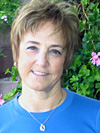
Cheri Fidler
Director, Center for Healthier Communities
Rady Children’s Hospital, San Diego, CA